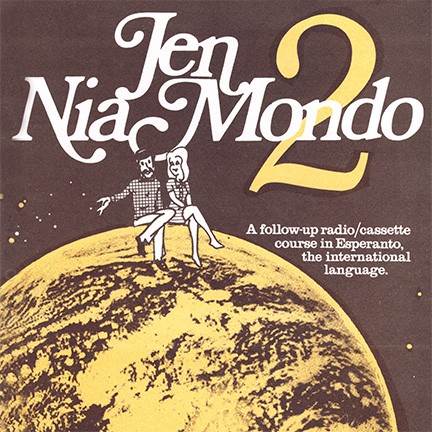
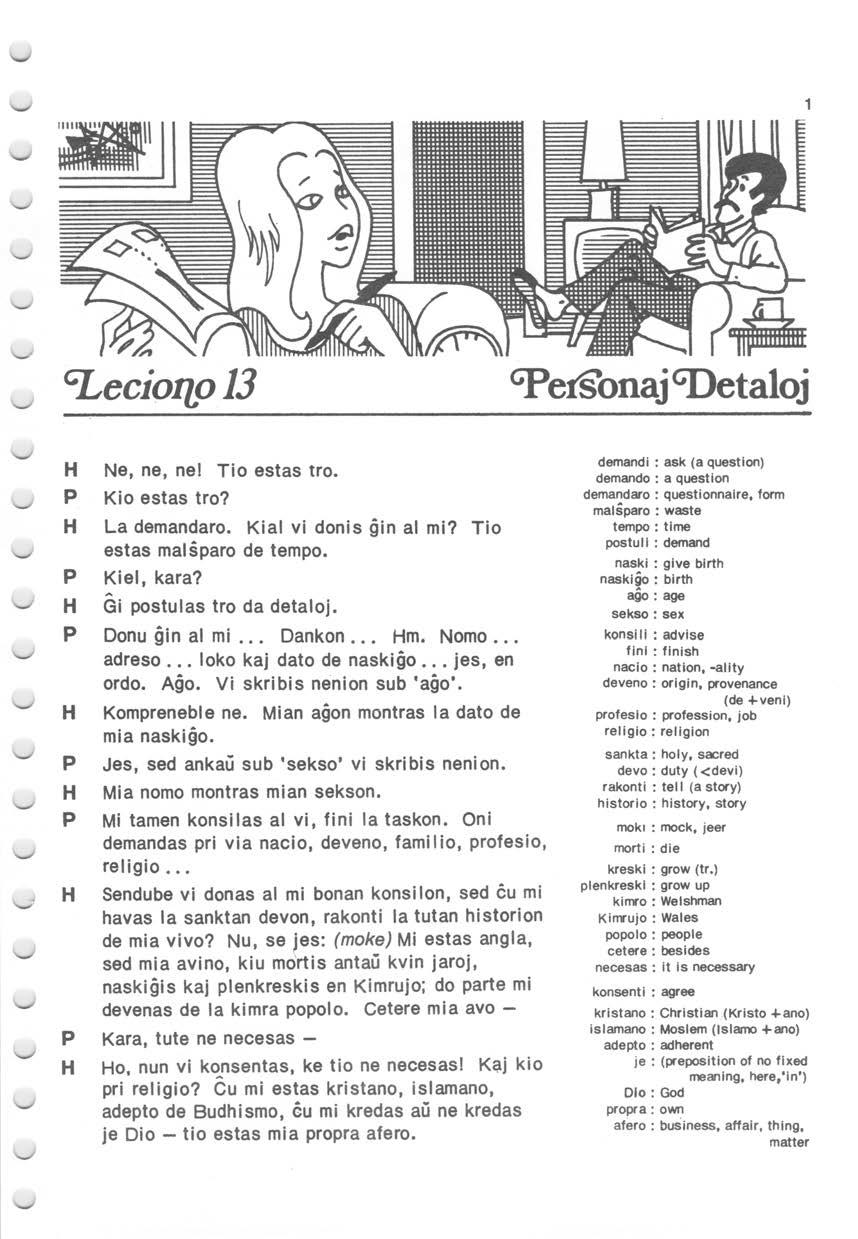
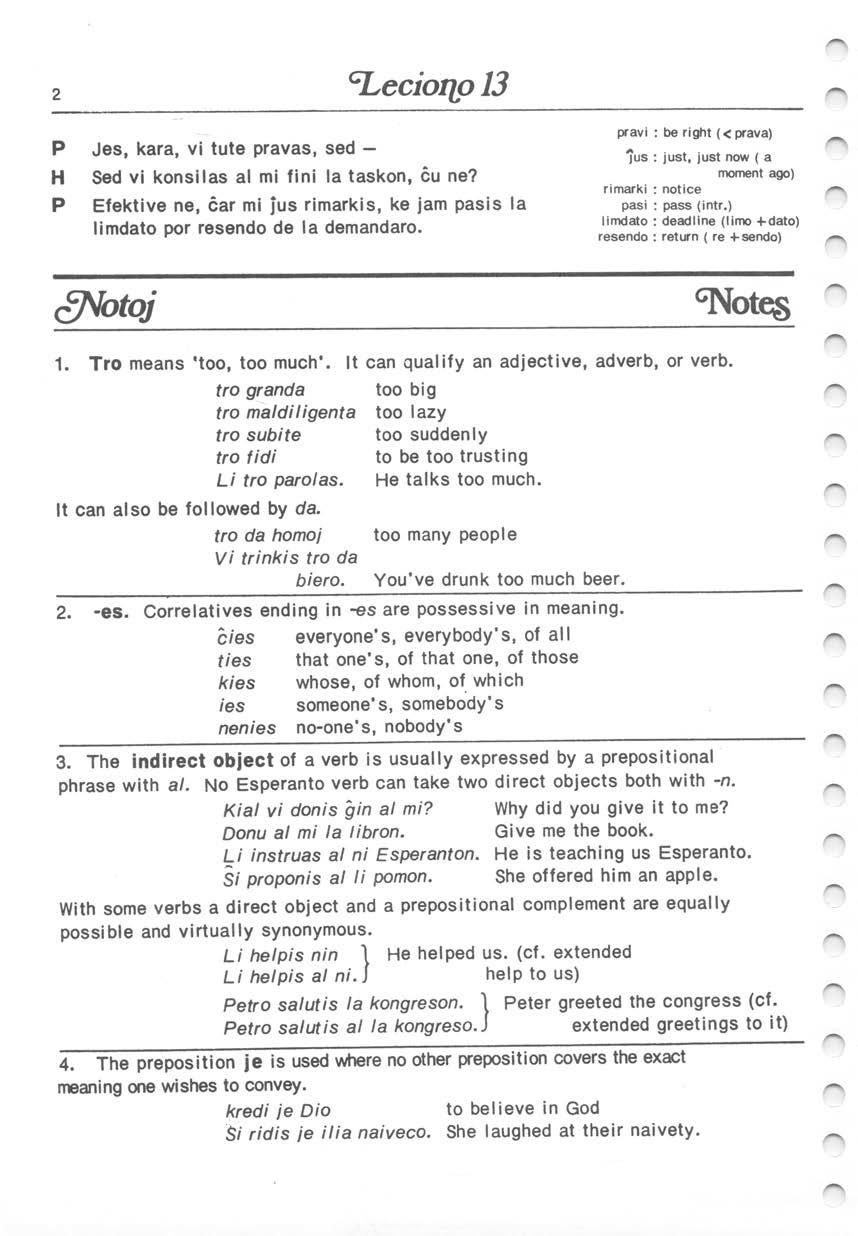
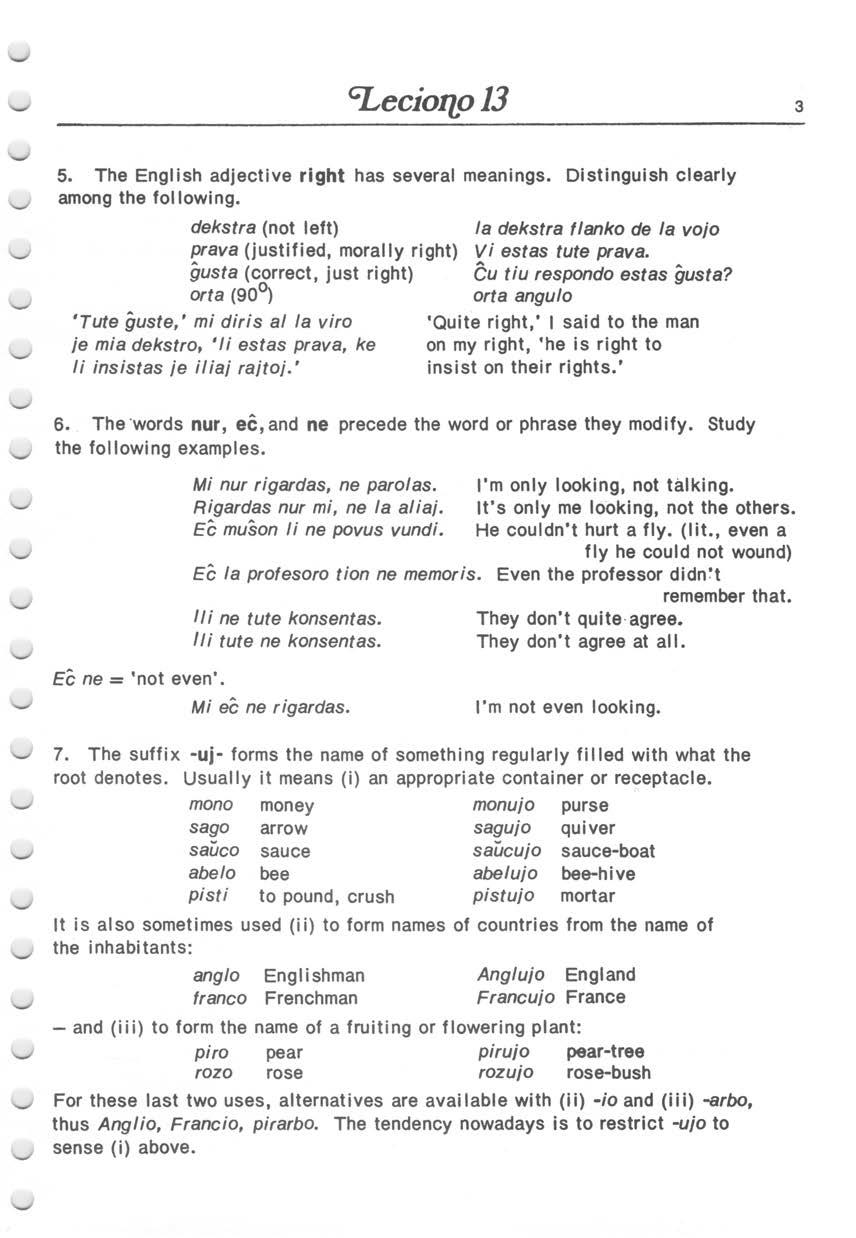
Introducing Lessons 13 – 25
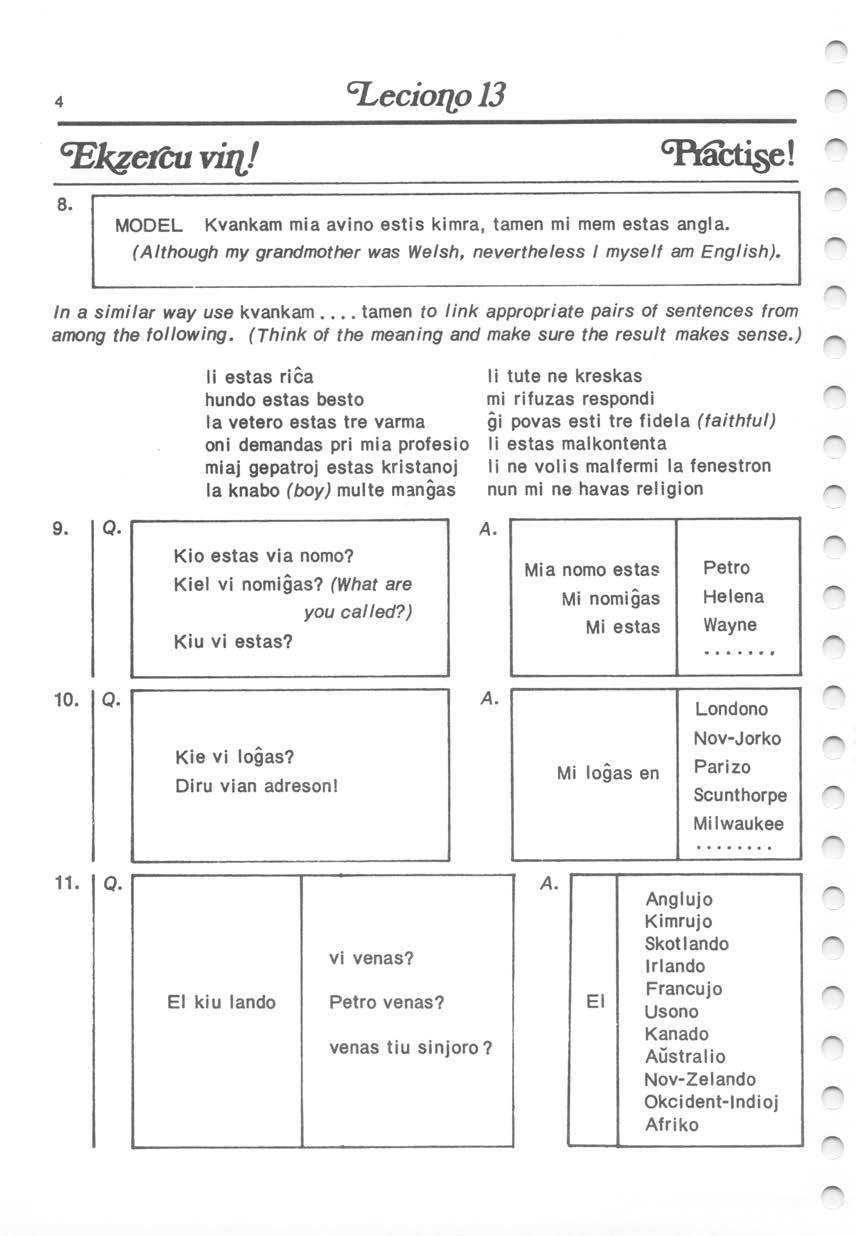
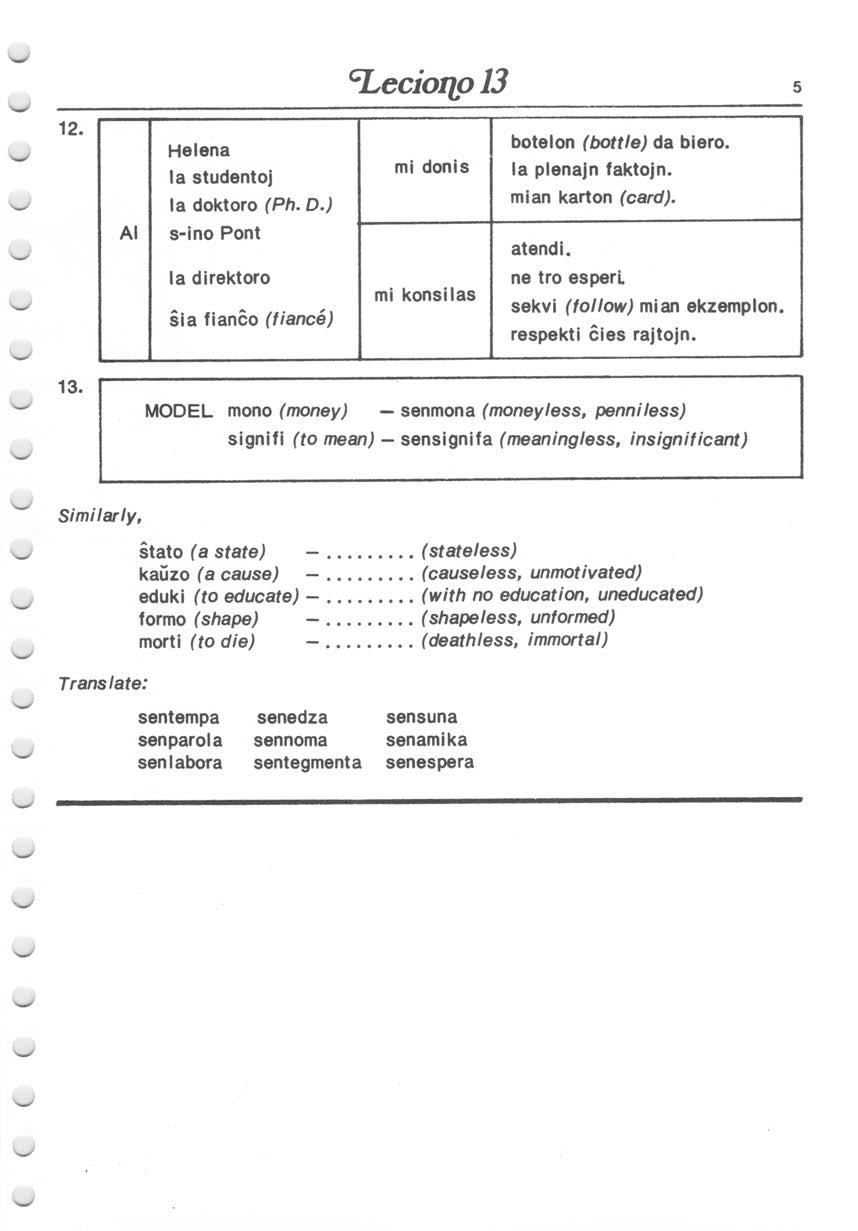
Section 14 Traduku
Helena: My grandparents came from Wales. Did your father come from Wales or Ireland, Peter?
Peter: No, my father did not come from Ireland. He was born in fact (efektive) in France, although his parents, my grandparents, were English.
Helena: How interesting! Where in France was your father born? Was it in Paris? (say- whether in Paris?)
Peter: No, my grandmother did not have [bear] him in Paris, but in Toulouse. My grandparents were living (say – lived) in that city. when my father was very young.
Helena: Did your father grow up in France?
Peter: Oh, no! He grew up in London. My grandfather taught French (say – the French [language]) in a university there.
Helena: What was your father called? Did he have a French Christian name?
Peter: Certainly not! His name was Arthur. (Arturo)

Answers are offered below
As previously you are recommended to commit as much to writing as possible. There are still many interesting and challenging aspects of grammar to meet, but building competence in vocabulary increasingly takes over in importance. The words introduced are listed alphabetically after each lesson.
In Esperanto learning to manipulate the language’s stock of well designed ‘affixes’ and ‘wordlets’ becomes very important. Just a few remarks here about ‘affixes’
As is stressed in various places there is really no difference between ‘ordinary’ roots and ‘affixes’. The latter however were designed to be attached easily to other roots and to cover a number of broad categories or classes, which in other languages often require new roots. Thus while ‘ejo’ and ‘loko’ essentially both mean ‘place’, the first has a wider coverage and can be used in circumstances where English (and other languages) may not have a single term ready. Similarly ‘ano’ and ‘membro’. The first is applied more broadly than the second. Some affixes like ‘ulo’ – an ‘individual characterised by the root’- and ‘aĵo’ – a ‘thing’ or ‘substance’ being a concrete form of the root’s idea – often do not have ready equivalents in English. Esperanto may present itself as a logical language, which indeed it generally is, but learning how affixes are really used is an acquired skill. For instance what does the ‘concrete form’ (aĵo) of a cow really mean? The convention is that it means the ‘meat’ of the animal.
Please attempt the exercises before consulting the material below.
Lesson 13 Answers
Page 4
Ekzercu vin! – Exercise yourself!
Section 8
Kvankam li estas riĉa, tamen li estas malkontenta – Although he is rich, he is however discontent.
Kvankam hundo estas besto, tamen ĝi povas esti fidela – Although a dog is an animal, it can however be faithful
Kvankam la vetero estas tre varma. li ne volas malfermi la fenestron
Kvankam oni demandas pri mia profesio mi rifuzas respondi
Kvankam miaj gepatroj estas kristanoj, tamen nun mi ne havas religion – Though my parents are Christians, I do not (however) have a religion.
Kvankam la knabo multe manĝas, tamen li tute ne kreskas – Though the boy eats a lot, he does not however grow at all.
Section 9
Kio estas via nomo? – Mia nomo estas Petro / What is your name? – My name is Peter
Kiel vi nomiĝas? – Mi nomiĝas Helena / How (what) are you called? – I am called Helen
Kiu vi estas? – Mi estas Wayne / Who are you? – I am Wayne
Section 10
Kie vi loĝas – Mi loĝas en Londono / Where are you living? – I am living in London
Kie vi loĝas? – Mi loĝas en Nov-Jorko / Where do you live? – I live in New York
Diru vian adreson! – Mi loĝas en Parizo / Tell (me) your address – I live in Paris
En kiu urbo vi loĝas? – Scunthorpe / What town do you live in? – In Scunthorpe
Section 11
El kiu lando vi venas? – Mi venas el Anglujo / What country do you come from? – I come from England
El kiu lando Petro venas? – Li venas el Irlando / What country does Peter come from? He comes from Ireland.
El kiu lando venas tiu sinjoro? – Tiu sinjoro venas el Kanado / What country does that gentleman come from? – That gent comes from Canada.
Page 5
Section 12
Al Helena mi donis botelon da biero – I gave Helen a bottle of beer
Al la studentoj mi donis la plenajn faktojn – I gave the students the plain facts.
Al la doktoro mi konsilas ne tro esperi – I advised the Ph.D not to hope for too much
Al sinjorino Pont mi konsilas atendi – I advised Mrs Pont to wait.
Al la direktoro mi donis mian karton – I gave the director my card
Al ŝia fianĉo mi konsilas sekvi mian ekzemplon – I advised her fiance to follow my example.
Section 13
senŝtata – stateless senkaŭza – causeless seneduka – uneducated senforma – shapeless senmorta – deathless
sentempa – timeless senedza – husbandless sensuna – sunless senparola – speechless sennoma – nameless senamika – friendless senlabora – workless sentegmenta – roofless senespera – hopeless
Section 14 Traduku
Helena: Miaj geavoj venis de Kimrio. Ĉu via patro venis de Kimrio aŭ Irlando, Petro?
Petro: Ne, mia patro ne venis de Irlando. Efektive li naskiĝis en Francio, kvankam liaj gepatroj, miaj geavoj, estis angloj.
Helena: Kiel interesa! Kie en Francio naskiĝis via patro? Ĉu en Parizo?
Petro: Ne, mia avino ne naskis lin en Parizo, sed en Tuluzo. Liaj gepatroj loĝis en tiu urbo kiam mia patro estis tre juna.
Helena: Ĉu via patro plenkreskis en Francio?
Petro: Tute ne! Li plenkreskis en Londono. Mia avo instruis la francan en universitato tie.
Helena: Kiel nomiĝis via patro? Ĉu li havis francan kristanan nomon?
Petro: Certe ne! Lia nomo estis Arturo.
Lesson 13 : Commit these words to memory!
Abel/o
Abel/uj/o
Adept/o
Afer/o
Afrik/o
Aĝ/o
Aŭstrali/o
Ceter/e
Ĉies
Dekstr/a
Demand/i
Demand/o
Demand/ar/o
Dev/o
De/ven/o
Di/o
Eduk/i
Fianĉ/o
Fin/i
Fin/iĝ/i
Form/o
Ĝust/a
Histori/o
Ies
Ili/a
Irland/o
Islaman/o
Je
Ĵus
Kanad/o
Kaŭz/o
Kies
Kimr/o
Kimruj/o
Knab/o
Konsent/i
Konsil/as
Konsil/i
Konsil/o
Kresk/i
Kresk/ig/i
Krist/an/o
Kvankam
Lim/dat/o
Mal/ŝpar/o
Mok/i
Mon/uj/o
Mort/i
Mort/ig/i
Naci/o
Nask/i
Nask/iĝ/o
Neces/as
Nenies
Nov-Zeland/o
Okcident/a
Ort/a (90o)
Pir/o
Pir/uj/o
Pist/i
Pist/uj/o
Popol/o
Postul/i
Prav/a
Prav/i
Profesi/o
Profesor/o
Propr/a
Rakont/i
Religi/o
Re/send/o
Rimark/i
Roz/uj/o
Sag/o
Sag/uj/o
Sankt/a
Saŭc/o
Saŭc/uj/o
Seks/o
Sen/eduk/a
Sen/form/a
Sen/kaŭz/a
Sen/mort/a
Sen/ŝtat/a
Signif/i
Ŝtat/o
Temp/o
Ties
Tro
Tro da
Tro da bier/o
Tro da hom/o/j
Tro fid/i
Tro grand/a
Tro mal/diligent/a
Tro parol/as
Tro subit/e
Uj/o
Bee
Beehive
Adherent
Affair, thing, matter
Africa
Age
Australia
Besides, moreover
Everyone’s, everybody’s
Right (side, not left)
Ask (a question)
A question
Questionnaire, form
Duty (< devi)
Origin, provenance
God
Educate
Fiance
Finish (tr) bring to end
Finish (ntr) come to end
Shape, form
Correct, just right
History, story
Someone’s, somebody’s
Their
Ireland
Moslem (Islam/o+ano)
Related somehow
Just, just now,
Canada
Cause
Whose, of which
Welshman
Wales
Boy cf knave
Agree
Advises
Advise
Advice
Grow (intr)
Grow (tr), make grow
Christian
(Al)though
Deadline
Waste
Mock, jeer
Purse, money bag
Die
Kill
Nation, nationality
Bear, give birth
Birth, become born
is necessary
No-one’s, nobody’s
New Zealand
West, western
Right angular
Pear
Pear-tree
Pound, crush
Mortar
People
Demand
Justified, right
Be right, justified
Profession, job
Professor
Own
Tell a story
Religion
Return (re+sendo)
Notice
Rose bush
Arrow
Quiver
Holy, sacred
Sauce
Sauce-boat
Sex
Uneducated
Shapeless, unformed
Unmotivated
Deathless, immortal
Stateless
Mean, signify
State, country
Time
That one’s, those ones’
Too; too much
Too ( da =quantity of)
Too much beer
Too many people
Be overtrusting
Too large
Too lazy
Talks too much
Too suddenly
Container, receptacl